Traditional and modern Chinese superstitions: Ghosts, gods, fate, and wedding dates
Chinese superstitious psychology has existed since ancient times. It originated from prehistoric religious ideas of primitive society. Through the development of Shang dynasty, Western Zhou dynasty, the Warrior Kingdom Period, Qin and Han dynasty and so on, it finally formed various forms of secular superstition in modern times and reformed under the influence of politics, economics, culture, and society in China. Chinese superstitions differ from province to province, and has also evolved through the influence of western superstitious and spiritual beliefs.
Chinese superstitious beliefs can be divided into three categories:
Traditional and secular Chinese superstitions
Originating from feudal society, these superstitious beliefs evolved into customs and religions but vary by region. The traditional secular superstition is mainly to believe that certain activities, ceremonies, numbers, natural phenomena, and dates will bring good luck, and taboo certain numbers and phenomena. For example, Chinese choose auspicious wedding dates according to the lunar calendar, because they believe that selected date can bring joy and harmony to marriage.
Believing the existence of ghost and gods
People believed that there are gods, demons and ghosts in the world, who have the ability to control the natural phenomena and the birth, aging and death of human beings. For example, on July 15th of lunar the , people in south worship river gods in hopes of fair weather and a good crop yield in the coming year. In modern China, these ceremonies based on superstitious beliefs are becoming less common.
Believing fate
Many superstitious Chinese believe in fate or destiny, and that their live path is arranged from birth. Hence, when they feel they are at a cross-road in life, some people may go to fortune-tellers for help to relive anxiety about their future.
Superstition and spirituality products in China
Due to such a long history of superstition, spirituality products in China have rich opportunities to develop. From crystals to amulets, from fortune-telling to tarot and horoscopes, the spirituality and occult industry is a big business today, but it still remains under researched in the domains of marketing.
The Healing Crystals market in China
Healing crystals are thought to promote physical, emotional and spiritual healing. Different colors and types of crystals have different functions. For example, pink crystals can bring more love and kindness in your life, while purple crystals help you get a better performance in study.
The Donghai Crystal Market, located in Lianyungang, Jiangsu province, China produces 70% of the national reserve of the precious material, is known as the “Land of Crystals”, producing 80% of Chinese crystal products. Donghai Market receives 1,000 foreign tourists and local visitors daily, 5,000 daily visitors during the peak and a total of 300,000 visitors a year. The annual turnover is between 469 million RMB and 480 million RMB. With the rapid development of the “Internet Plus”, Donghai Market also caught the express train of internet development, forming an “online + offline” omni-channel sales system. So far, there are more than 30,000 crystal online stores in 27 domestic and foreign e-commerce sales platforms. The cumulative sales volume of crystal exceeded 160 million on Double 12 Day. The price range of crystals on Taobao is from 60 RMB to 5,000 RMB.
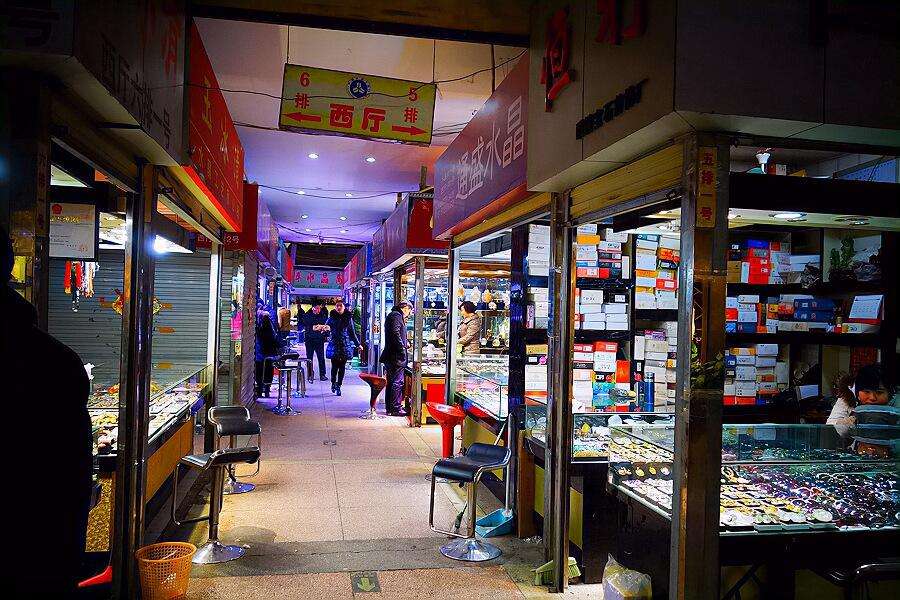
Source: Popo. Inside of Donghai crystal market
Amulets market in China
Amulets originate from Southeast Asia, including Buddha amulets, ghost amulets and Guman Thong. People worship amulets with sacrifice in hopes of achieving aspirations such as getting promotion and getting rich. There are 3,000 online shops on Tabao with average sales of 300-500 items per month. The price varied from a hundred to more than ten thousand. In term of people’s comments on Zhihu, amulets made by Luang Por and ajahn are popular in the market.
Foreign superstitions influence: The tarot and astrology market in China
Tarot was introduced to Chinain the late Qing dynasty from Europe but is now prevalent in the 21st century. Tarot cards it is a tool for analyzing, predicting and advising people.
Astrology which is also from Europe has become enormously popular among young people in China. Astrology is the idea that stars can shape personalities and destiny. It is a name given to a group of stars in the sky that make up a certain pattern, and everyone has their own astrology based on their birth date, time, and location.
Both Tarot and astrology possess a potential in China’s spirituality and occult market. In 2005, the China Tarot Association (CTA) was established with 270,000 members, and the overall downloads of astrology and Tarot reached 80,000 times in App stores. According to the survey launched by China Youth Daily, 70.3% of the respondents say that there are many people like astrology around them and 20% of them follow the guidance of astrology and tarot cards to arrange their relationships and career paths. The most popular tarot shops on Taobao has more than 3,000 orders in a month, and each order costs around 100 RMB to 200 RMB.
Read more on how astrology is used in Chinese marketing
Fortune-telling market in China
Chinese fortune-telling has thousands of years’ history; known as ‘suanming’ in Chinese,it is a practice of predicting information about a person’s life. Among many kinds of Chinese superstitions, fortune-tellers have the most active believers. 362 million have visited physiognomist, which is a fortune-teller who analyzes fate or personality based on facial characteristics, in the past 12 months. In comparison, Nearly 145 million people in China believe in Fengshui, 141 million believe in the God of wealth
More than 91% of Chinese do not have scientific literacy are more likely to believe fortune-telling. However, fortune-telling, as an ancient and mysterious business, has becomes popular in venture capitalism in China. The “Internet plus” fortune-telling business seems to have entered a stage of vigorous development, and AI fortune-telling is the product. Opening up WeChat’s mini programs, there are many AI fortune-telling programs come out. Users only need to upload their face photos and the intelligence software will decode photos and generate an analysis report.
Until December 2019, according to data from Tianyancha, more than 50 projects of AI fortune-telling have been financed. A certain Guangdong culture company makes an annual net profit of 500 million RMB by fortune-telling.
Interest trends of superstition and spirituality products in China
From Baidu index’s result, fortune-telling‘s search trend transcends the other 4 categories with absolute advantage. Thanks to the long history of traditional superstition, fortune-telling is more popular and credible in China. Guman Thong is on the second place, because the effect of Guman Thong is exaggerated on Internet, covered with a veil of mystery. There are many stories of raising Guman Thong on forum that saying how it helps them achieve their desires, and what punishments you will get if you do not treat them well which further strengthening awe towards Guman Thong and making people believe Guman Thong indeed has superpower.


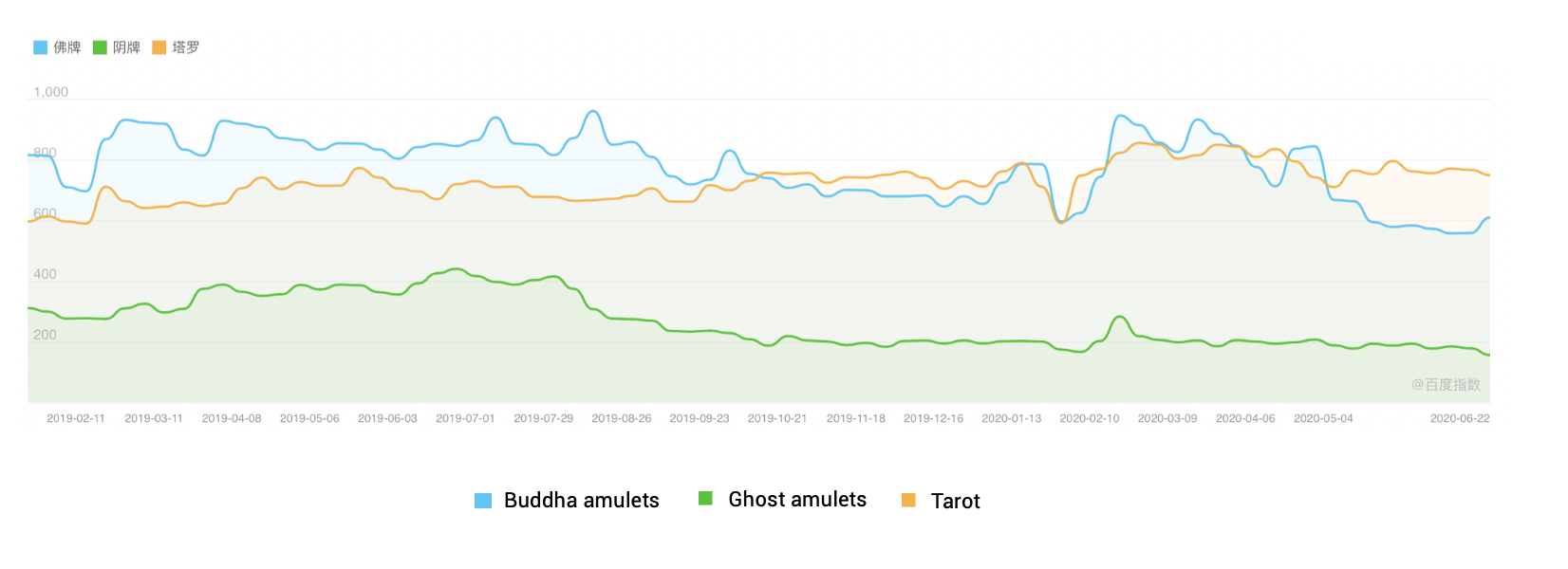
Source: Baidu index, search trends of Chinese superstitious and spirituality products
Distribution and promotion methods
Social media
These sellers are active on all kinds of social media such as Douyin, Bilibili, Kuaishou and Weibo, and mainly focus on short video platforms. At the first stage, sellers need to cultivate their social media account by filming divination videos to attract followers. Once audience feel like videos are efficacious, they will contact video bloggers for paid one-to-one consultation, and bloggers will sell spirituality products to audience.
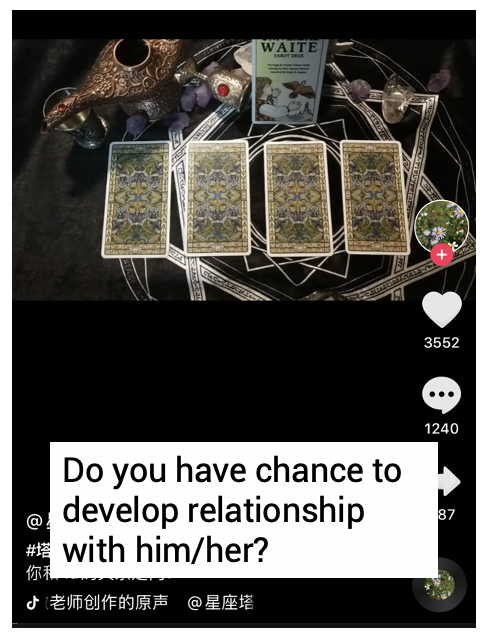
Source: Douyin, Tarot divination
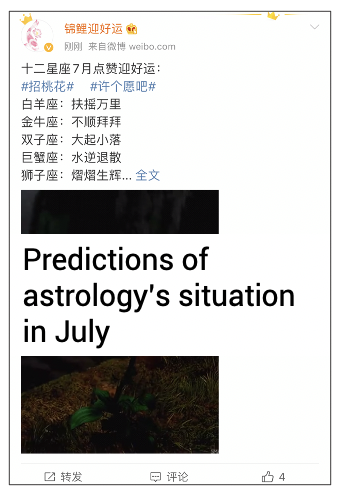
Source: Weibo, July’s astrology predictions on the Chinese internet

Source: Kuaishou, Tarot divination
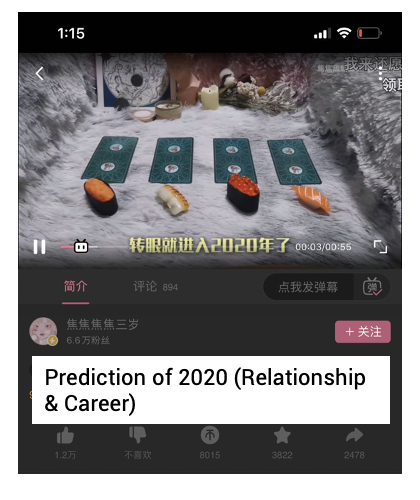
Source: Bilibili, Tarot divination
E-commerce
Consumers also will search key words like “Fortune-telling” and “Tarot” in Taobao to seek one-to-one consultation. Usually, consumers pay online via e-commerce platforms, and add sellers’ WeChat for deep consultation.
Advertising
The most common advertising method for superstitious service is through Baidu and Tianya forums related to Chinese superstition. Fortune tellers or superstitious product distributors will leave their WeChat ID on the Chinese web for people to add.
Consumers of superstitious, spiritual and occult products in China
According to the Baidu index, 60% of Baidu searches of spirituality products are from 20-29 year olds, meaning they are a significant part of market online. People from 30-39 years old also occupied a large proportion around 30-40%. Two factors are at play to explain this data, first is that people of this age group are computer savvy and are simply more likely to turn to Baidu than local temples. Secondly is these two age groups are in the most anxious stages during the whole lifetime. They are at an age where they make a lot of important life decisions, like marriage, having children, and career path. Once they encounter problems, asking for help online is their top of mind. The data also shows that 70% of them are female
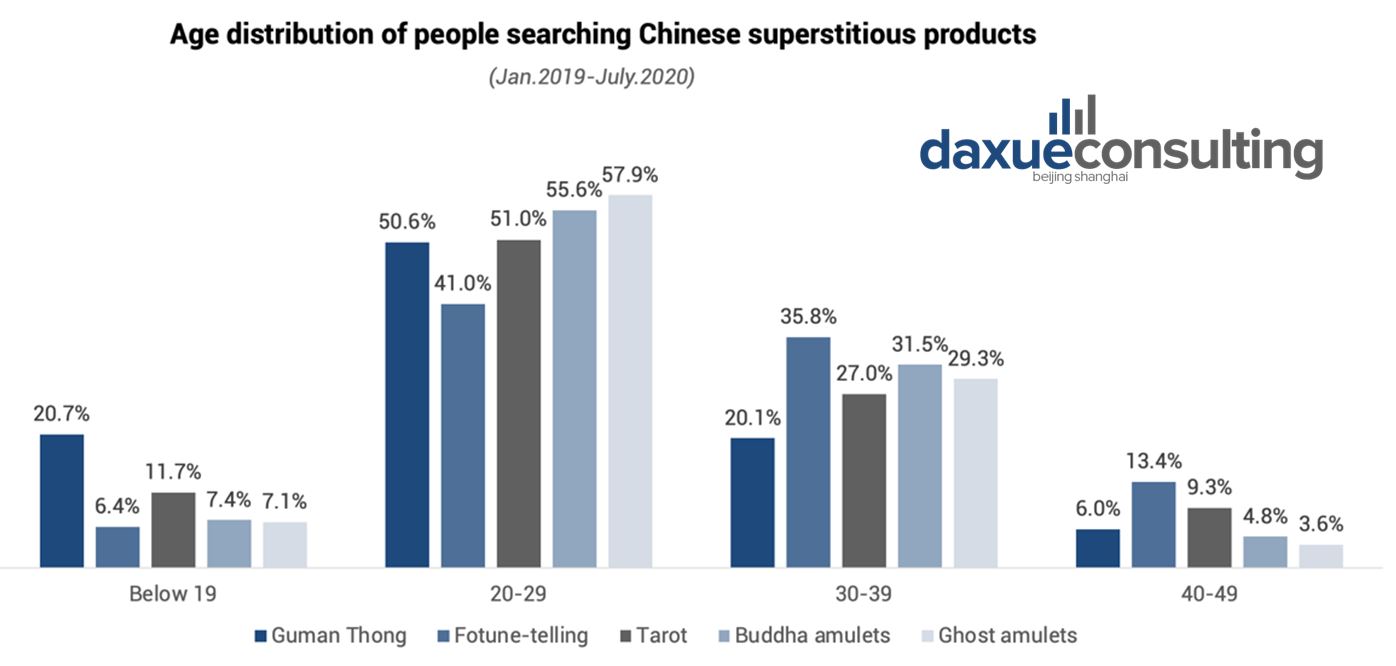
Data source: Baidu index, age distribution of e-commerce spirituality products’ consumers
Based on these two insights, divination questions on social media are mainly targeting females aged from 20-39. For example, on Bilibili and Douyin, you definitely will find that most of videos are around marriage, romantic relationships and careers, targeting females. For example, “your next relationship” and “will you end up together”. These are exactly what females from these two age groups confront.

Source: Bilibili, Tarot divination
Is scientific literacy really the end of Chinese superstitions?
The rise of scientific literacy is somewhat of a threat to many traditional Chinese superstitions. However, the modern society does make room for the evolution of the spiritual and occult market in China. Especially, due to their busy work schedules and family pressures, many people feel helpless and search for answers. For some, spiritual products are what support them to keep going.
Hence, scientific literacy is not the end of the Chinese superstitions market. In fact, they seem to go hand-in-hand, Al fortune-telling projects is one piece of evidence, along with the popularity of Tarot card short videos. Although some prefer Chinese fortune-telling due to its long history in China, younger generations around 20-39 show a high interest in foreign superstitions. Younger generations show a higher acceptance of new things and they are active in social media, meaning they are likely to be imbued with new values and thoughts.
Listen to 100 China entrepreneur stories on China Paradigms, the China business podcast
Listen to China Paradigm on Apple Podcast
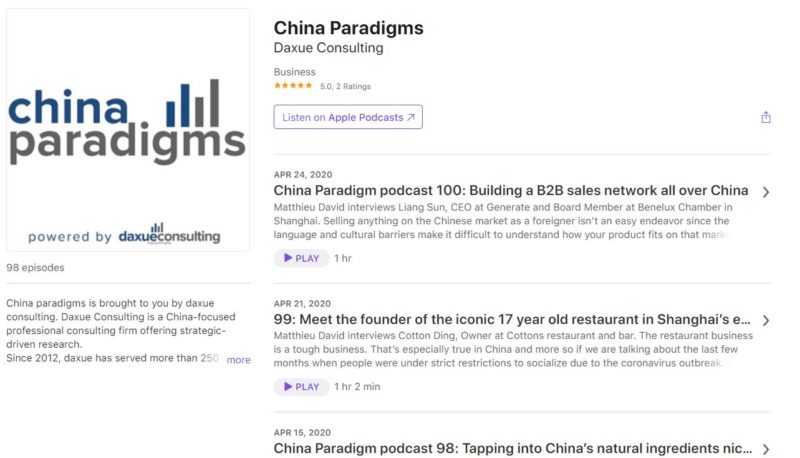


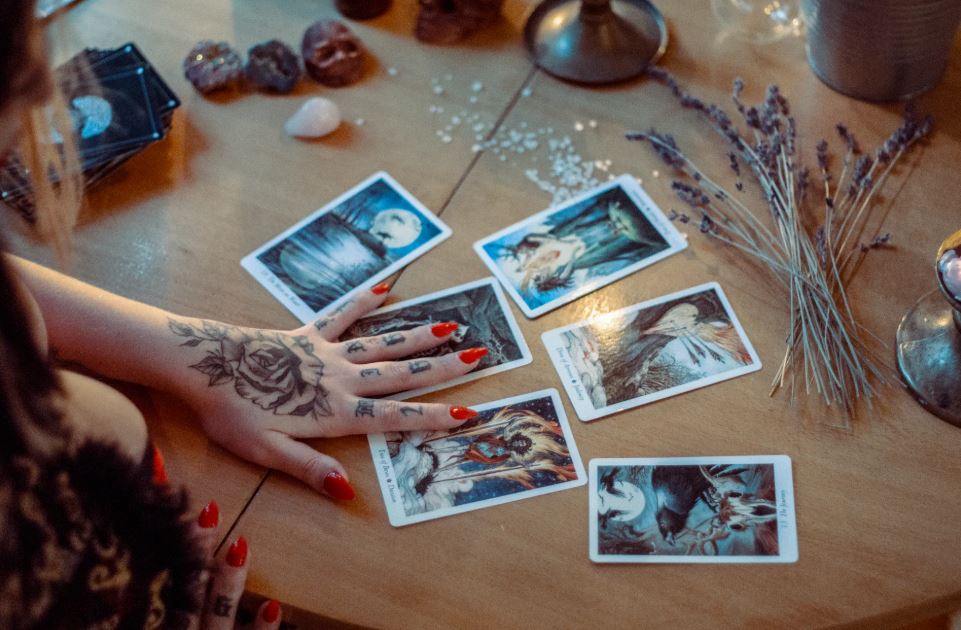


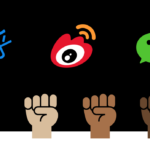




![[Podcast] China paradigm #28: Using thought leadership and social media to accelerate your business in China](../wp-content/uploads/2019/04/China-business-podcast-28-Ashley-Galina-150x150.jpg)




